Investment Banking Internship Cover Letter
[Your Name]
[Your Address]
[City, State, ZIP Code]
[Your Email Address]
[Your Phone Number]
[Date]
[Recipient's Name]
[Recipient's Title]
[Investment Banking Firm Name]
[Company Address]
[City, State, ZIP Code]
Dear [Recipient's Name],
I am writing to express my strong interest in the Investment Banking Internship opportunity at [Investment Banking Firm Name] as advertised on [where you found the internship posting, e.g., the company's website or a job search platform]. With a solid foundation in finance, a passion for analyzing market trends, and a drive for excellence, I am excited about the prospect of contributing to your team and gaining valuable experience in investment banking.
As a [Your University Name] student pursuing a [Your Major] degree, I have developed a robust understanding of financial concepts, including valuation techniques, financial modeling, and risk assessment. My coursework in [Relevant Coursework, e.g., Financial Analysis, Corporate Finance] has equipped me with the quantitative and analytical skills essential for success in the investment banking field. Moreover, my active involvement in [Any Finance or Investment-Related Clubs or Organizations] has allowed me to enhance my networking abilities and stay updated on industry trends.
During my academic journey, I completed a [Relevant Project or Internship] where I applied financial modeling to analyze investment opportunities, presenting my findings in a clear and concise manner to a team of professionals. This experience not only honed my technical skills but also reinforced my ability to collaborate and communicate effectively in a fast-paced environment.
What sets me apart is my unwavering commitment to continuous learning and my keen attention to detail. I am drawn to [Investment Banking Firm Name] due to its reputation for innovation, client-centric approach, and dedication to professional growth. I am eager to learn from your team of seasoned professionals and contribute my fresh perspective to your projects.
Enclosed is my resume, which provides further details on my academic achievements, relevant coursework, and extracurricular activities. I am excited about the opportunity to discuss how my skills align with the needs of your team and how I can contribute to [Investment Banking Firm Name]'s ongoing success.
Thank you for considering my application. I look forward to the opportunity to speak with you further about my candidacy. Please feel free to contact me at [Your Phone Number] or [Your Email Address] to schedule an interview.
Sincerely,
[Your Name]
Traditional Investment Banking Internship Application
Dear [Hiring Manager's Name],
I am writing to express my strong interest in the Investment Banking Summer Internship position at [Bank Name] for Summer 2026. As a junior at [University Name] majoring in Finance with a concentration in Corporate Finance, I am eager to contribute to your [specific division] team while developing my analytical and financial modeling skills.
Through my coursework in Financial Statement Analysis and Corporate Valuation, I have built a solid foundation in DCF modeling, comparable company analysis, and precedent transactions. My academic performance, reflected in my 3.8 GPA, demonstrates my commitment to excellence and ability to master complex financial concepts.
Last summer, I interned at [Company Name] where I assisted in preparing pitch materials for three M&A transactions totaling $500 million. I conducted industry research, built financial models, and prepared presentation decks for client meetings. This experience reinforced my passion for investment banking and equipped me with practical skills in Excel, PowerPoint, and financial analysis.
I am particularly drawn to [Bank Name] because of your leading position in [specific sector] and recent advisory work on [specific deal]. Your firm's commitment to [specific value or initiative] aligns with my professional values and career aspirations.
I would welcome the opportunity to discuss how my analytical skills, work ethic, and enthusiasm for finance can contribute to your team. Thank you for considering my application.
Sincerely,
[Your Name]
Networking-Based Application Following Informational Interview
Dear [Hiring Manager's Name],
Following my informational interview with [Employee Name] last week, I am writing to formally apply for the Investment Banking Analyst Internship at [Bank Name]. Our conversation about your team's work in [specific sector] confirmed my strong interest in pursuing this opportunity.
[Employee Name] shared insights about [Bank Name]'s collaborative culture and analytical rigor, which resonated with my experience leading a team of four students in our university's investment fund. As Portfolio Manager, I oversaw the analysis of 12 companies across technology and healthcare sectors, resulting in portfolio returns of 18% over the academic year.
My technical preparation includes completing Wall Street Prep's financial modeling course, passing the Bloomberg Market Concepts certification, and maintaining proficiency in Excel through self-directed projects. Additionally, my internship at [Previous Company] exposed me to due diligence processes and client communication in a fast-paced environment.
What excites me most about [Bank Name] is your recent expansion into [specific area] and your reputation for providing interns with meaningful responsibilities from day one. I am confident that my proactive approach and genuine passion for deal-making would allow me to make immediate contributions to your team.
I appreciate your consideration and look forward to the opportunity to discuss my qualifications further.
Best regards,
[Your Name]
Career Changer from Different Industry
Dear [Hiring Manager's Name],
I am writing to apply for the Investment Banking Internship at [Bank Name], bringing a unique perspective shaped by my background in engineering and recent transition toward finance. After two years as a data analyst at [Tech Company], I have decided to pursue my long-standing interest in investment banking.
My engineering background has equipped me with exceptional quantitative and problem-solving abilities. At [Tech Company], I built predictive models that improved revenue forecasting accuracy by 23% and presented findings to C-suite executives quarterly. These experiences developed my analytical rigor and communication skills—both essential in investment banking.
To demonstrate my commitment to this career transition, I have completed the CFA Level I exam, finished a financial modeling certification, and enrolled in evening courses in corporate finance and valuation at [Institution]. Additionally, I have been actively networking with professionals at bulge bracket banks to understand the demands and expectations of the role.
I am particularly interested in [Bank Name]'s [specific sector] practice, where my technical background and analytical expertise would be valuable assets. The intersection of technology and finance in your recent deals, such as [specific transaction], aligns perfectly with my skill set and interests.
I recognize that my path is unconventional, but I believe my diverse background, demonstrated work ethic, and genuine passion for finance would enable me to excel in this role. I would welcome the chance to discuss how my unique perspective can contribute to your team.
Thank you for your consideration.
Sincerely,
[Your Name]
Early Application (Sophomore Level)
Dear [Hiring Manager's Name],
As a sophomore at [University Name] studying Economics and Mathematics, I am writing to express my interest in early internship opportunities at [Bank Name] for Summer 2026. While I understand that most investment banking internships target juniors, I am eager to demonstrate my readiness through my academic achievements and proactive skill development.
Despite being early in my academic career, I have distinguished myself by maintaining a 3.9 GPA while taking advanced courses typically reserved for upperclassmen, including Intermediate Financial Accounting and Derivatives Markets. My quantitative aptitude is further demonstrated by my performance in Multivariable Calculus and Linear Algebra.
To prepare for a career in finance, I have taken significant initiative beyond the classroom. I joined the university's Investment Banking Club as a freshman, where I completed a 40-hour training program covering financial modeling and valuation techniques. I also secured a spring break externship at [Boutique Firm], where I shadowed analysts and gained exposure to the daily responsibilities of investment banking.
I am particularly impressed by [Bank Name]'s track record of developing young talent and your recent work advising [Company] on their $[X] billion merger. The opportunity to learn from your team would be invaluable to my professional development.
I understand that this is an unconventional ask, but I am confident that my work ethic, intellectual curiosity, and genuine passion for finance would allow me to exceed expectations. I would greatly appreciate the opportunity to discuss how I can contribute to your team.
Thank you for considering my application.
Respectfully,
[Your Name]
Application Highlighting International Background
Dear [Hiring Manager's Name],
I am writing to apply for the Investment Banking Summer Internship at [Bank Name], bringing a global perspective shaped by my international background and cross-border experience. As a junior at [University Name] originally from [Country], I am excited about the opportunity to contribute to your team, particularly in transactions involving emerging markets.
My multicultural background has equipped me with unique insights into international business practices and cross-border M&A complexities. I am fluent in [Languages], which has proven valuable during my internship at [Company], where I supported due diligence on a $200 million acquisition involving entities in three countries. I coordinated communication between international teams and helped identify regulatory considerations that others might have overlooked.
Academically, I have excelled in courses such as International Finance, Global Capital Markets, and Cross-Border Transactions, maintaining a 3.85 GPA. My coursework, combined with my lived experience navigating different business cultures, has prepared me to add value in today's increasingly globalized deal environment.
[Bank Name]'s strong presence in [specific international markets] and your recent advisory work on [specific cross-border deal] align perfectly with my background and interests. I am particularly drawn to your firm's approach to navigating complex regulatory environments in international transactions.
I would welcome the opportunity to discuss how my international perspective, language skills, and analytical capabilities can strengthen your team's ability to serve clients in global markets.
Thank you for your consideration.
Sincerely,
[Your Name]
Application Emphasizing Technical/Quantitative Skills
Dear [Hiring Manager's Name],
I am writing to apply for the Investment Banking Summer Internship at [Bank Name], offering a robust quantitative skill set developed through my dual degree in Computer Science and Finance at [University Name]. In an industry increasingly driven by data analytics and complex modeling, I believe my technical capabilities would be a significant asset to your team.
My programming proficiency in Python, SQL, and VBA has enabled me to automate financial analyses and build sophisticated models beyond standard Excel capabilities. During my recent internship at [Fintech Company], I developed a Python-based valuation tool that reduced analysis time by 40% while improving accuracy. I also created automated data visualization dashboards that helped senior analysts identify trends and anomalies more efficiently.
Beyond technical skills, I have cultivated strong business acumen through coursework in Corporate Finance, Financial Markets, and Econometrics, maintaining a 3.87 GPA. I understand that technical expertise must be complemented by financial judgment, communication skills, and commercial awareness—all areas where I have invested significant effort.
[Bank Name]'s reputation for innovation and your recent focus on leveraging technology in deal execution, particularly in your [specific group], strongly appeals to me. I am excited about the possibility of contributing to your team's analytical capabilities while learning from the best in the industry.
I would appreciate the opportunity to discuss how my unique combination of technical and financial skills can add value to your investment banking platform.
Thank you for your consideration.
Best regards,
[Your Name]
Referral-Based Application
Dear [Hiring Manager's Name],
I am writing to apply for the Investment Banking Summer Internship at [Bank Name], as recommended by [Referrer's Name], [Referrer's Title] in your [Division]. After speaking with [him/her] about the role and learning more about your team's work in [specific sector], I am confident that this opportunity aligns perfectly with my career goals and qualifications.
Currently a junior at [University Name] majoring in Finance, I have prepared extensively for a career in investment banking. My academic record includes a 3.82 GPA and completion of advanced courses in Mergers & Acquisitions, Leveraged Buyouts, and Financial Modeling. I have complemented my coursework with practical experience through a summer internship at [Company], where I built financial models, conducted comparable company analyses, and assisted in preparing materials for three live transactions.
[Referrer's Name] mentioned that your team values candidates who demonstrate initiative and intellectual curiosity. These qualities have defined my academic and professional journey—from founding my university's Private Equity Club to independently completing six online financial modeling courses to continuously seeking learning opportunities from industry professionals.
I am particularly drawn to [Bank Name]'s client-focused approach and your leadership in [specific industry/sector]. Your recent role advising on [specific transaction] exemplifies the type of high-impact work I aspire to contribute to throughout my career.
I would welcome the opportunity to discuss my qualifications and learn more about how I can contribute to your team's continued success.
Thank you for your consideration.
Sincerely,
[Your Name]
What is an Investment Banking Internship Cover Letter and Why Do You Need It
An investment banking internship cover letter is a formal business document that accompanies your resume when applying for internship positions at investment banks, including bulge bracket firms, middle-market banks, and boutique advisory firms. Unlike cover letters for other industries, investment banking cover letters must demonstrate not only your qualifications but also your understanding of the industry, commitment to the demanding nature of the work, and genuine interest in the specific firm and group.
Purpose and importance:
- Demonstrates your communication skills, which are critical in client-facing roles
- Provides context for your resume and explains career transitions or gaps
- Shows you've researched the firm and understand what differentiates it from competitors
- Proves you can articulate complex ideas concisely—a vital skill in banking
- Serves as a screening tool for banks receiving thousands of applications
- Offers an opportunity to showcase personality and cultural fit beyond resume bullet points
- Addresses any potential concerns about your candidacy proactively
- Signals professionalism and attention to detail, both highly valued in banking
Who Should Write and Send an Investment Banking Internship Cover Letter
Primary candidates who should send cover letters:
- Undergraduate juniors applying for summer analyst positions (most common)
- Sophomores seeking early internship opportunities or spring week programs
- Graduate students (MBA, Masters in Finance) pursuing associate-level internships
- Career changers from other industries seeking to break into finance
- International students who need to explain visa status or language proficiencies
- Candidates with non-traditional backgrounds (liberal arts, engineering, sciences)
- Students from non-target schools who need to compensate with compelling narratives
- Applicants with employment gaps or unusual academic circumstances requiring explanation
The letter should authentically represent:
- Your genuine voice and personality (while maintaining professionalism)
- Your actual accomplishments and experiences
- Your real motivations for pursuing investment banking
- Your authentic interest in the specific firm (avoid generic content)
To Whom Should You Address the Investment Banking Internship Cover Letter
Primary recipients:
- Named recruiting contact listed in the job posting (always first choice)
- Managing Director or Director heading the specific group you're applying to
- Campus recruiting coordinator for your university
- HR representative overseeing internship programs
- Alumni from your school working at the firm (if you've networked with them)
Research strategies for finding the right recipient:
- Check the bank's careers page and application portal for specific instructions
- Use LinkedIn to identify recruiting team members or relevant managing directors
- Consult your university's career services for existing recruiting relationships
- Ask alumni or current employees during informational interviews
- Review the bank's website for division or group leadership if applying to specific teams
Default options when no specific name is available:
- "Dear Hiring Manager" (acceptable but less personal)
- "Dear [Bank Name] Recruiting Team"
- "Dear Investment Banking Recruitment Committee"
- Never use "To Whom It May Concern" (too impersonal for banking)
When Should You Send an Investment Banking Internship Cover Letter
Timing and scenarios requiring cover letters:
- When submitting applications during on-campus recruiting cycles (typically August-September)
- When applying through online portals during off-cycle or rolling recruitment
- After informational interviews that lead to formal application invitations
- When reaching out speculatively to banks not actively recruiting at your school
- Following networking events or conferences where recruiters suggested applying
- When alumni or employees offer to forward your application internally
- Before superday interviews if additional materials are requested
- When applying for spring insight programs or sophomore opportunities (November-January)
- During late-stage recruiting for remaining positions (January-March)
- When converting from another internship type (private equity, consulting) to banking
Application timeline considerations:
- Target schools: Applications typically due September-October for following summer
- Non-target schools: May need to apply earlier or through alternative channels
- Off-cycle opportunities: Monitor throughout the year as positions open
- International locations: Different recruiting calendars based on region
Requirements and Prerequisites Before Writing Your Cover Letter
Essential preparations:
- Research the specific bank thoroughly (recent deals, culture, rankings, news)
- Identify the specific division or group you're targeting
- Update your resume to ensure consistency with cover letter content
- Gather details about relevant coursework, GPA, and academic achievements
- Document previous internships or work experiences with quantifiable results
- Compile list of relevant skills (Excel, financial modeling, languages)
- Complete informational interviews to gain insider perspectives
- Obtain permission from referrers if mentioning their names
- Review the job description carefully to address all requirements
Technical prerequisites:
- Strong academic performance (typically 3.5+ GPA for competitive positions)
- Relevant coursework in finance, accounting, or economics
- Basic financial modeling knowledge or willingness to learn
- Understanding of fundamental banking products and services
- Familiarity with recent market events and major transactions
- Competency in Microsoft Office, particularly Excel and PowerPoint
Professional prerequisites:
- Professional email address for correspondence
- LinkedIn profile that matches your application materials
- Available references if requested during the process
- Clear understanding of visa status if applicable to international students
How to Write an Effective Investment Banking Internship Cover Letter
Writing process and thought framework:
- Begin by analyzing the job description and identifying key requirements
- Create an outline matching your experiences to their needs
- Draft opening paragraph that immediately captures attention with specific details
- Develop body paragraphs showcasing relevant experiences with quantifiable achievements
- Research recent deals or initiatives to demonstrate genuine interest
- Conclude with confident call-to-action expressing enthusiasm
- Edit ruthlessly for conciseness—every word must add value
- Remove any generic statements that could apply to any bank or position
- Proofread multiple times for grammatical errors and typos (fatal in banking)
Content development strategy:
- Use the STAR method (Situation, Task, Action, Result) for experience descriptions
- Quantify achievements wherever possible (percentages, dollar amounts, timeframes)
- Connect your skills directly to investment banking responsibilities
- Demonstrate knowledge of the specific bank's recent work and positioning
- Show progression and learning across experiences
- Address any potential weaknesses or gaps proactively
- Maintain confident but humble tone throughout
- Avoid repeating resume content verbatim—provide context and insight instead
Formatting Guidelines for Investment Banking Internship Cover Letters
Length and structure requirements:
- Maximum one page (typically 300-400 words)
- Three to four concise paragraphs
- Standard business letter format with proper spacing
- 10-12 point professional font (Times New Roman, Calibri, Arial)
- 1-inch margins on all sides
- Single-spaced paragraphs with space between them
Tone and style expectations:
- Professional yet personable (avoid being overly stiff)
- Confident without arrogance
- Enthusiastic but not desperate
- Direct and concise—bankers value efficiency
- Action-oriented language emphasizing results
- Industry-appropriate terminology demonstrating insider knowledge
- Error-free with perfect grammar and punctuation
Delivery format:
- PDF format to preserve formatting (unless system requires otherwise)
- File naming convention: LastName_FirstName_CoverLetter_BankName.pdf
- Email applications: Cover letter in body of email AND attached as PDF
- Online portals: Follow exact upload instructions provided
- Printed letters: High-quality paper if hand-delivering (rare)
Elements and Structure of the Cover Letter
Essential components in order:
- Contact information block (your details, date, recipient's details) if sending traditionally
- Professional greeting addressing specific person when possible
- Opening paragraph: Position being applied for, how you learned about it, immediate hook
- Body paragraph 1: Academic background, relevant coursework, GPA, achievements
- Body paragraph 2: Professional experience with quantified accomplishments
- Body paragraph 3: Why this specific bank and role (demonstrates research and fit)
- Closing paragraph: Enthusiasm, availability, call-to-action
- Professional sign-off (Sincerely, Best regards) and typed name
Optional but valuable additions:
- Brief mention of relevant certifications (CFA, Bloomberg, financial modeling courses)
- Language proficiencies if relevant to the position
- Leadership roles in finance clubs or investment organizations
- Specific deals or transactions the bank handled that interest you
- Referral mention if applicable (with permission)
Items to never include:
- Salary expectations or compensation discussions
- Negative comments about other banks or experiences
- Excessive personal information unrelated to the position
- Controversial opinions or political statements
- Humor or overly casual language
- Desperation or negative self-talk
What to Do After Sending Your Investment Banking Internship Cover Letter
Immediate follow-up actions:
- Save a copy of exactly what you submitted for future reference
- Document application date and method in a tracking spreadsheet
- Set a reminder to follow up in 2-3 weeks if no response received
- Continue networking with employees at the firm
- Prepare for potential phone screens or interviews immediately
- Research the firm deeper in anticipation of interview questions
- Practice discussing your cover letter and resume content confidently
Timeline for follow-up communication:
- Wait at least 2 weeks before initial follow-up email
- Follow up with networking contacts who made referrals after 1 week
- If you receive interview invitation, respond within 24 hours
- Send thank-you notes within 24 hours after any interview
- Be patient during peak recruiting season—banks receive thousands of applications
Continued engagement strategies:
- Attend bank-sponsored campus events and information sessions
- Participate in case competitions or workshops hosted by the firm
- Connect with additional employees for informational interviews
- Update your application if you achieve significant new accomplishments
- Monitor the firm's news and deals to stay informed for interviews
Common Mistakes to Avoid in Investment Banking Cover Letters
Fatal errors that typically result in rejection:
- Spelling errors, typos, or grammatical mistakes (shows lack of attention to detail)
- Addressing the wrong bank or using generic "insert bank name here" placeholders
- Exceeding one page or using dense, difficult-to-read formatting
- Including false or exaggerated information about experiences
- Copying templates without customization (recruiters recognize these immediately)
- Failing to proofread for consistency with your resume
- Using overly casual language or inappropriate humor
- Starting with weak openings like "I am writing to apply for..."
Content mistakes:
- Making the letter about what you want rather than what you offer
- Listing resume content without providing context or insights
- Failing to demonstrate knowledge of the specific bank
- Using clichés and buzzwords without substance ("team player," "hard worker")
- Being too modest or underselling your accomplishments
- Including irrelevant experiences that don't relate to banking
- Focusing on long-term career goals beyond the internship
- Apologizing for perceived weaknesses instead of positioning them positively
Technical mistakes:
- Sending in wrong file format or with corrupted formatting
- Using unprofessional email addresses for correspondence
- Forgetting to attach the cover letter to your application
- Submitting after deadlines or during inactive recruiting periods
- Applying to multiple divisions within same bank without targeting your message
Advantages and Disadvantages of Investment Banking Internship Cover Letters
Advantages of submitting strong cover letters:
- Differentiates you from candidates with similar academic credentials
- Demonstrates communication skills essential for client interaction
- Provides opportunity to explain non-traditional background positively
- Shows initiative and genuine interest in the specific institution
- Allows you to contextualize impressive achievements from your resume
- Creates memorable personal narrative that helps recruiters remember you
- Demonstrates cultural fit and understanding of banking industry demands
- Can compensate for lower GPA or non-target school status with compelling story
Potential disadvantages or limitations:
- Time-consuming to customize properly for multiple applications
- May not be read carefully if your resume doesn't meet minimum requirements
- Can hurt your chances if poorly written or contains errors
- Some banks with automated systems may prioritize resume keywords over narratives
- Difficult to stand out when banks receive thousands of well-written letters
- May reveal weaknesses if you draw attention to them unnecessarily
- Can seem generic or insincere if not sufficiently customized
- Creates additional material that must remain consistent with interview responses
Comparing Investment Banking Cover Letters to Other Application Methods
Cover letter vs. networking:
- Networking often more effective for getting your foot in the door
- Cover letters required regardless of networking strength at most banks
- Referrals from employees can make cover letter more impactful
- Cold applications rely more heavily on cover letter quality
- Networking provides talking points that strengthen cover letter content
Investment banking vs. other finance internships:
- IB cover letters require more specificity about deals and industry knowledge
- Consulting cover letters emphasize problem-solving over financial skills
- Private equity letters focus more on investment thesis and analysis
- Corporate finance letters are typically less intense and more broad
- IB letters demand higher level of polish and formality
Alternative strategies to traditional cover letters:
- Video cover letters (rare but emerging at some firms)
- LinkedIn applications with customized message feature
- Direct email outreach to specific group heads or MDs
- Application through alumni referral systems
- Competition wins or case study presentations as proof of capability
- Personal website or portfolio demonstrating financial modeling skills
Tips, Tricks, and Best Practices for Investment Banking Cover Letters
Power strategies for standing out:
- Lead with your most impressive, quantifiable achievement in the opening
- Name-drop specific recent deals the bank completed that interest you
- Mention conversations with current employees (with permission) to demonstrate networking
- Use industry terminology correctly to signal insider knowledge
- Include one unique personal detail that makes you memorable (but keep it professional)
- Tailor each letter extensively—generic applications are immediately obvious
- Show progression and learning trajectory across your experiences
Writing efficiency techniques:
- Create a master template with your standard paragraphs
- Maintain a document of your quantified achievements ready to insert
- Research all your target banks at once and document differentiating factors
- Develop a bank-specific paragraph library to mix and match
- Use bullet points in your draft, then convert to prose for final version
- Write multiple versions and ask mentors which resonates most
Insider secrets from recruiters:
- First and last paragraphs matter most—middle can be skimmed
- Demonstrating cultural research (work-life balance approach, training programs) shows diligence
- Mentioning specific groups or product areas shows targeted interest
- Former athletes or military members should highlight discipline and work ethic
- Connecting your thesis topic or research to banking shows intellectual curiosity
- Expressing awareness of banking's demands without complaining shows realistic expectations
How Many Cover Letters Should You Write and How Long Should They Be
Quantity considerations:
- Write unique, customized letters for each bank (never mass-apply with identical letters)
- Target 10-20 banks realistically based on your profile and time constraints
- Quality over quantity—five excellent applications beat twenty mediocre ones
- Apply to mix of reach, target, and safety banks based on your credentials
- Consider 2-3 letters per bank if applying to multiple divisions (with permission)
Length specifications:
- Optimal length: 300-400 words maximum
- Never exceed one page regardless of font size or margin manipulation
- Aim for 3-4 concise paragraphs
- Each paragraph should be 4-7 sentences maximum
- Opening and closing paragraphs can be shorter (2-3 sentences)
- If you can't make your case in one page, your message isn't focused enough
Time investment:
- First cover letter: 3-4 hours including research and multiple drafts
- Subsequent letters: 1-2 hours each with template adaptation
- Research per bank: 30-60 minutes minimum
- Proofreading and editing: 30 minutes minimum per letter
- Total application season investment: 20-40 hours for comprehensive campaign

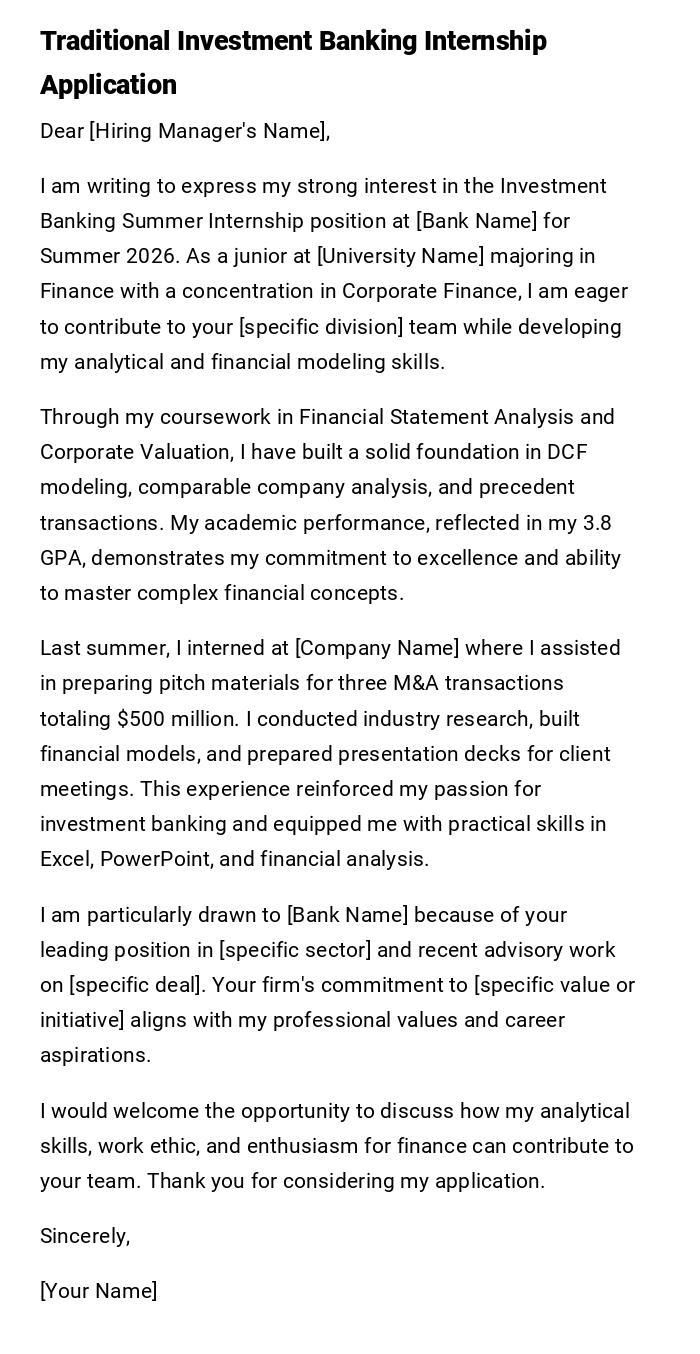
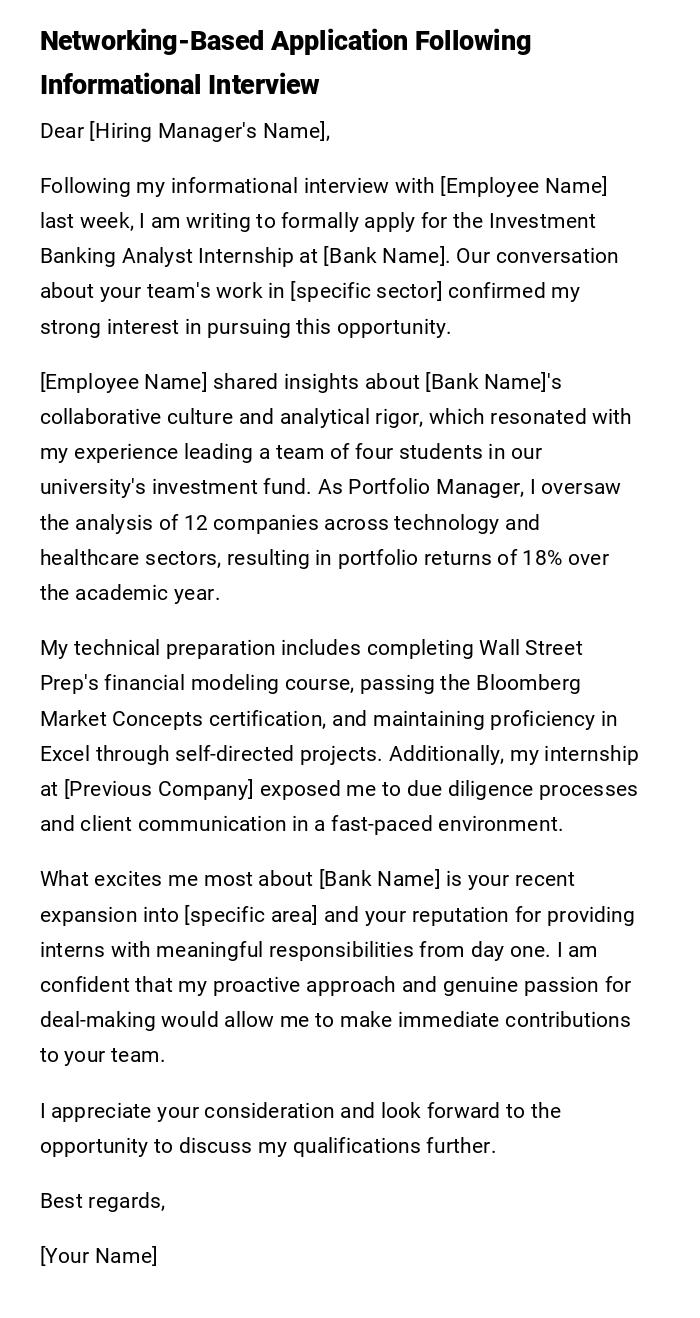
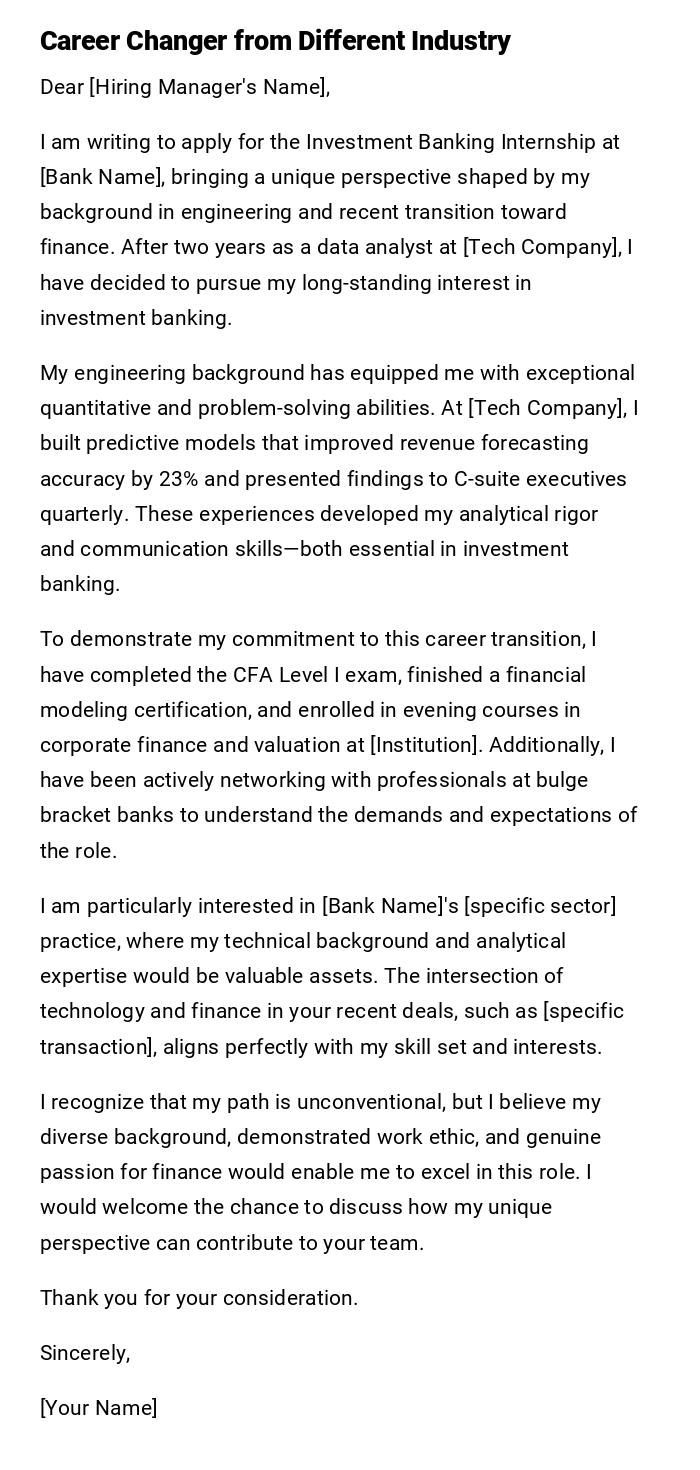
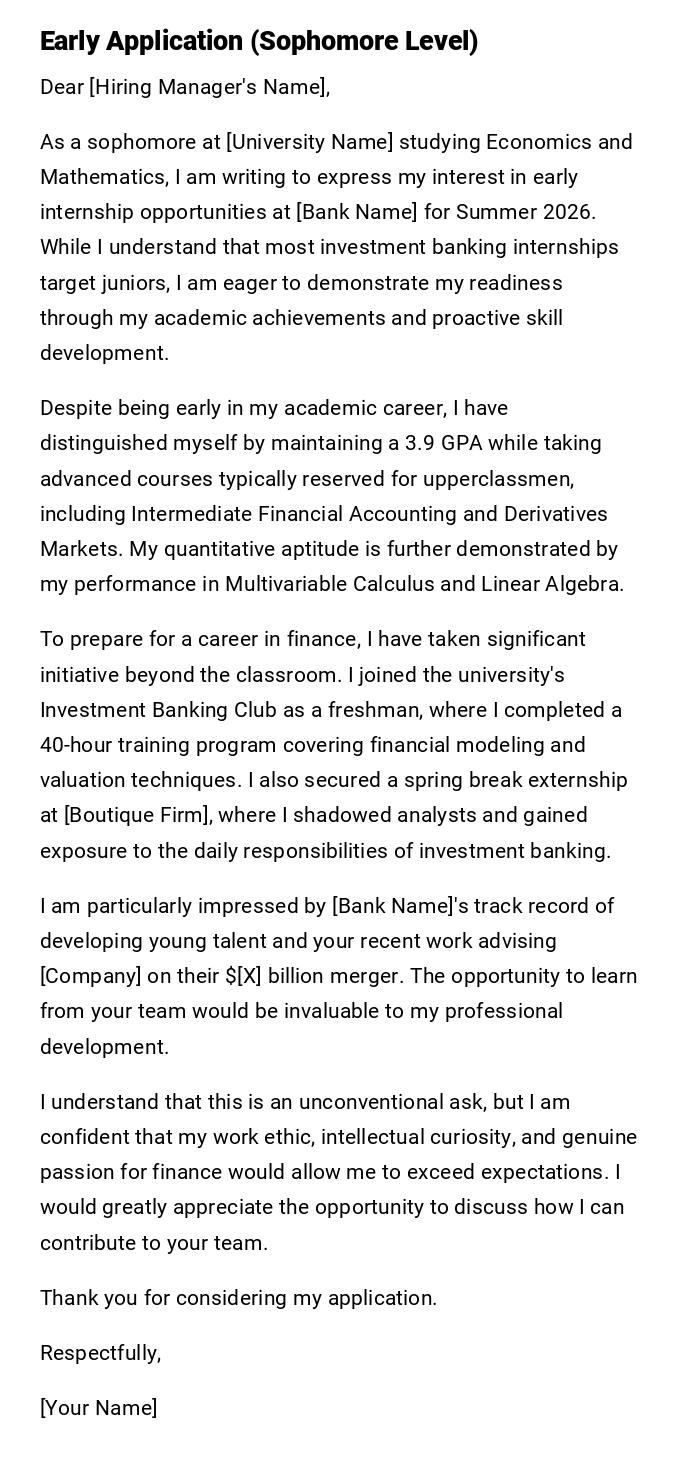
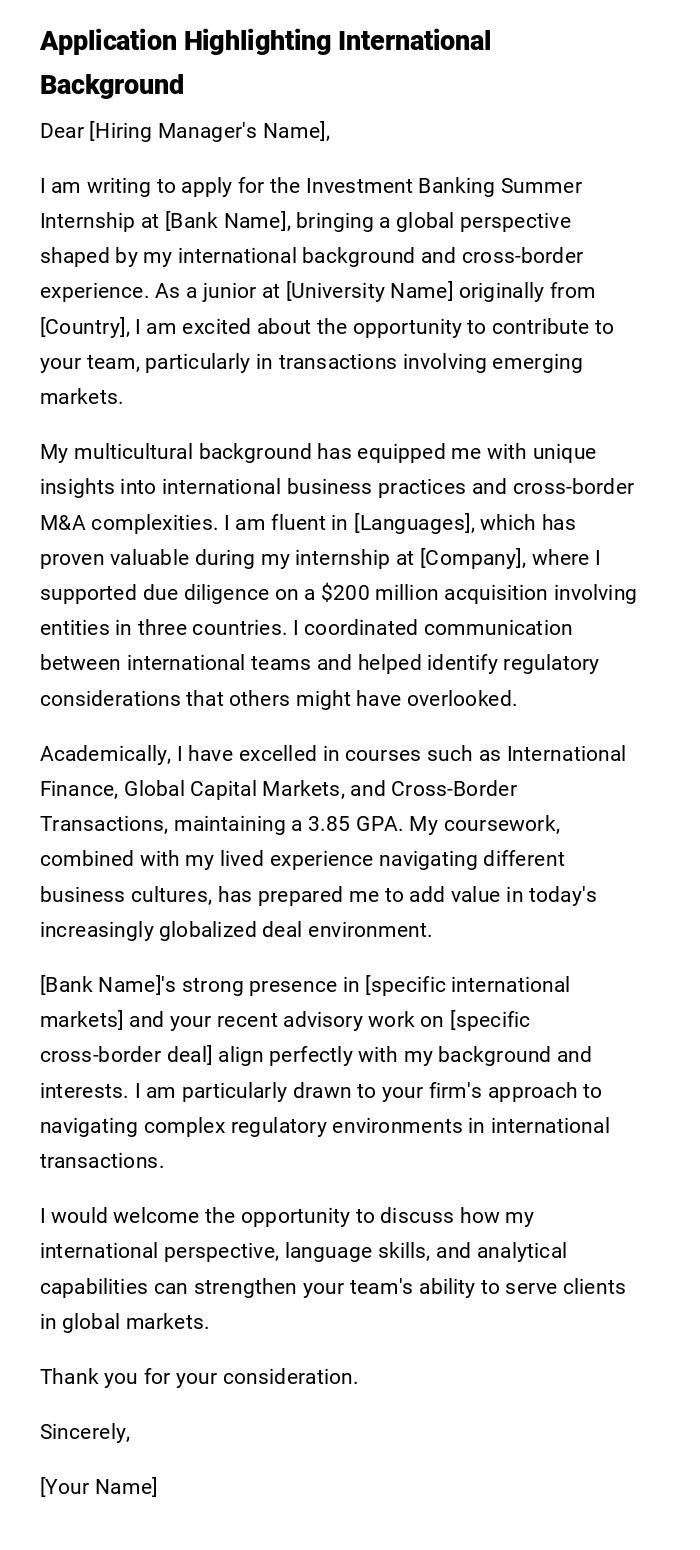
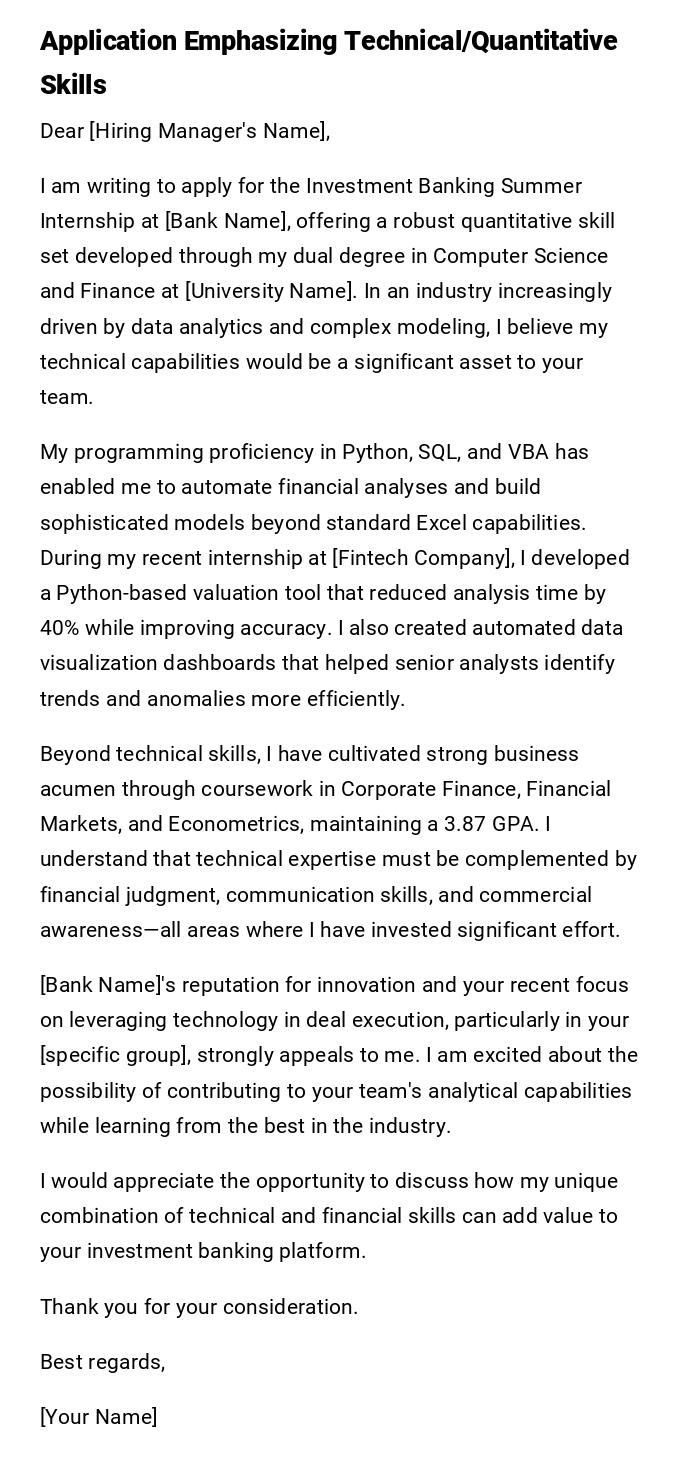
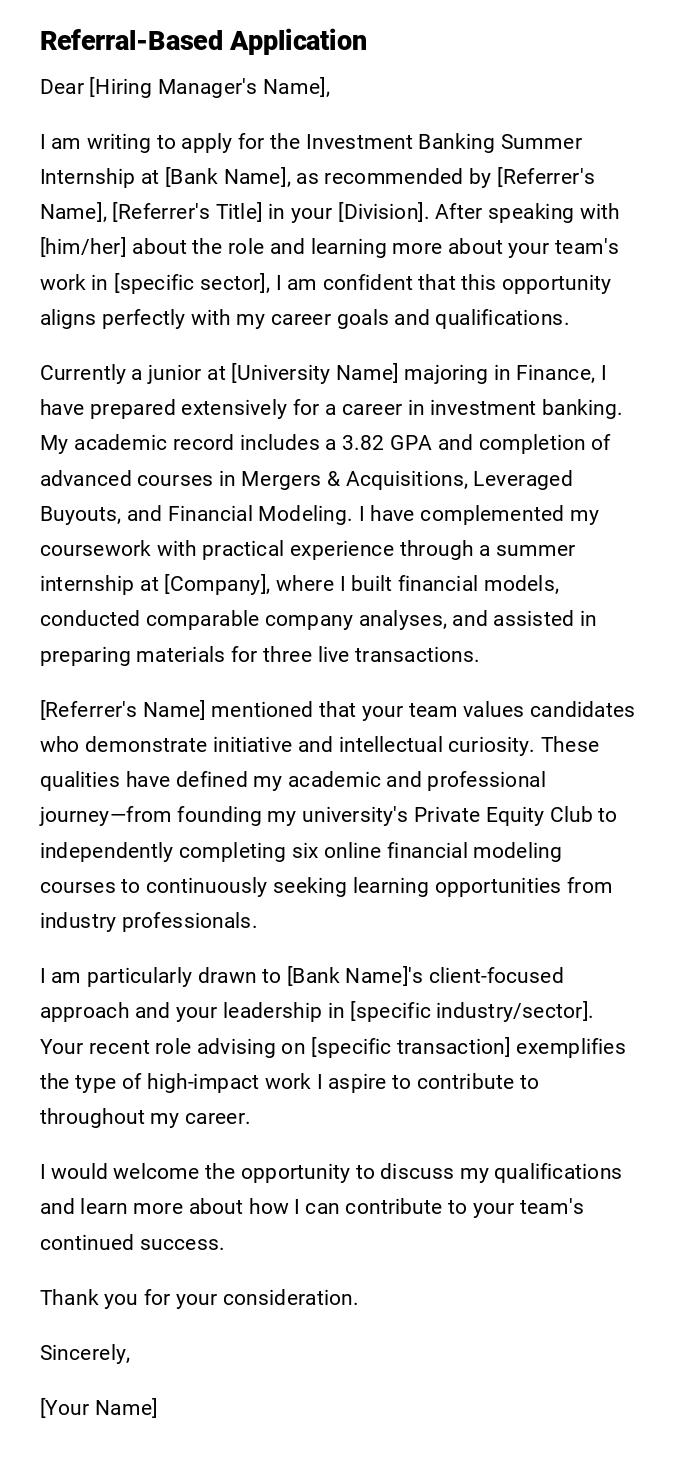

 Download Word Doc
Download Word Doc
 Download PDF
Download PDF